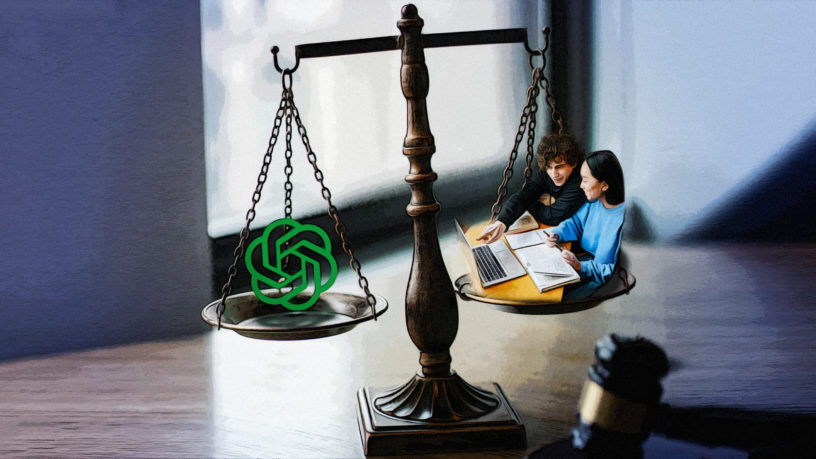By Sarah Grishpul
Disclaimer: This story is a work of fiction by the author, who is definitely not a robot. Probably.
Despite ongoing conversations surrounding the ban of artificial intelligence (AI) tools from classrooms, many professors at Toronto Metropolitan University (TMU) prefer for students to use ChatGPT rather than copy each other’s work.
Hoity McToity is a long-serving history professor who started teaching at the university before the internet was cool. He considers himself to be one of the few “pro-AI” members of the TMU faculty. While speaking to The Eyeopener about his hot takes one afternoon, Professor McToity said papers written by AI are easier to identify than those written by most students.
“One assignment I gave to my students was to write about an important figure in the French Revolution,” he said. “I had a student submit a 2,000-word essay about the illustrious history of King Louis XXI. It was a great piece—too bad there never was a King Louis XXI.”
According to McToity, the last French ruler before the fall of the monarchy was King Louis XVI.
“Only an AI software could have made up an entire historical figure from scratch,” he said matter-of-factly.
“Instead of complaining, we should be grateful that students are submitting mediocre work on time”
The paper trail doesn’t end there. McToity revealed they had uncovered three identical essays about the fictitious King Louis XXI submitted by three different students.
“What I’m assuming happened is that three students copied the assignment instructions into the software and received the exact same responses,” he said. “Despite being grad students, they’re not all that bright.”
Ethan Ethicson is another TMU professor who firmly believes using AI to cheat is better than students plagiarizing each other’s work. He describes the situation as “the lesser of two evils,” with plagiarism punishment falling only on the shoulders of one student instead of two.
“We’ve basically divided the academic crime rate in half,” stated Ethicson.
The Eye cannot verify that these statistics are accurate.
Ethicson further explained that despite current efforts by the Academic Integrity Office, students will continue to find new ways to cheat, scheme and lie to get through their studies.
“It’s time to move on and accept that plagiarism is a natural way of life,” he said nonchalantly. “Each generation has its own version of cheating, this is simply just the latest trend. Instead of complaining, we should be grateful that students are submitting mediocre work on time.”
Both Ethicson and McToity are part of an underground coalition of pro-ChatGPT professors. The unofficial faculty organization meets once a month in the Kerr Hall basement to discuss the latest breakthroughs in computer-generated essays while indulging in light refreshments.
“I’m actually relieved when a student submits a paper that was written by AI”
Professor Cornelius Conspirious is a new member of the group who spoke to The Eye about the stigma they face for their beliefs. Many faculty members have been scared to speak positively of AI due to backlash and fear-mongering tactics by the university.
“I just don’t see why it’s such a big deal,” he said. “I, for one, welcome our new AI overlords and urge all teaching staff to join us in a new era of enhanced learning.”
Since the rise of AI chatbots, Conspirious has been training his students to use generative artificial intelligence in preparation for the imminent AI invasion.
“My plan is to teach them to live amongst AI,” he said. “It will give them a better chance of survival once ChatGPT has overthrown Lachemi.”
When asked where Conspirious had received this information, he said he had asked the chatbot when AI would commit a hostile takeover and it responded, “soon.”
McToity’s colleague, professor Eliza PrimaDonna, has actively encouraged her students in ENG 354: Creative Writing for Dummies to write their assignments solely using ChatGPT.
“I’m actually relieved when a student submits a paper that was written by AI,” she said. “Back in the day, the amount of spelling errors I had to fix would take up the majority of my marking time. Thanks to ChatGPT, the content may be emotionless but at least it’s grammatically correct!”
PrimaDonna has been reprimanded by the Academic Integrity Office for actively promoting the use of AI in assignments. Several professors involved in the ever-growing “pro-AI” movement have written and signed a letter of protest against her suspension.
The Eye has run the letter through an AI verification tool and uncovered that it was also written by ChatGPT.












Leave a Reply